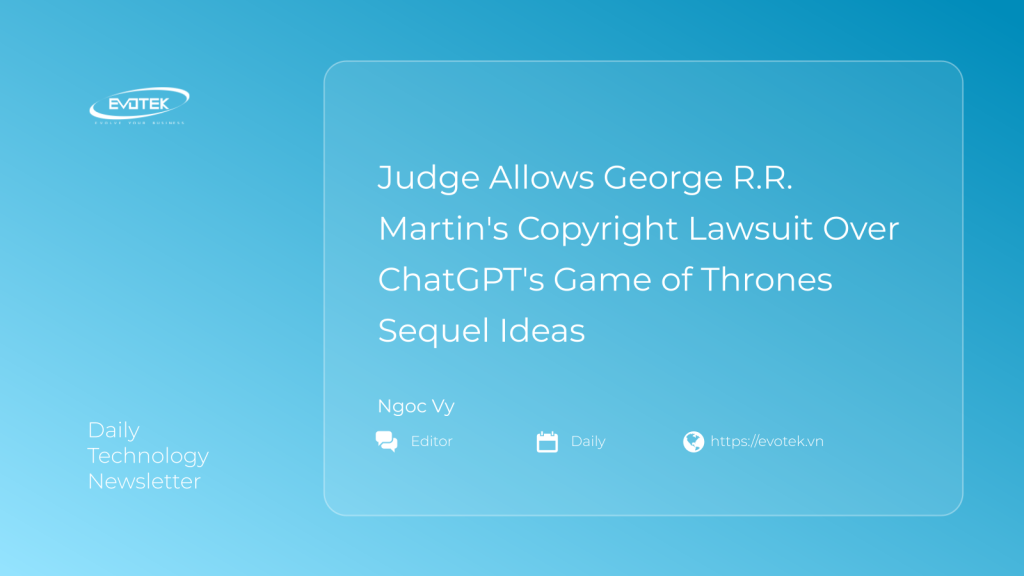A significant federal court decision has permitted a class-action lawsuit filed by numerous authors, including the renowned George R.R. Martin, to advance against artificial intelligence giants OpenAI and Microsoft. Central to the judge’s ruling was a specific instance involving ChatGPT’s generation of a potential sequel idea for Martin’s celebrated “A Song of Ice and Fire” series, the literary foundation for “Game of Thrones.” This legal development sets the stage for a crucial examination of copyright in the age of generative AI, though the pivotal question of “fair use” remains an undecided factor.
The decision to greenlight this extensive legal action came from US District Judge Sidney Stein, who, in his 18-page ruling from Manhattan federal court, specifically addressed the contentious issue of AI-created narratives. Judge Stein indicated that a “reasonable jury” might conclude that certain AI-generated “outputs” bear a “substantially similar” resemblance to the plaintiffs’ original copyrighted material. He highlighted an outline for a book within George R.R. Martin’s “A Song of Ice and Fire” saga, created by ChatGPT, as a prime example of content that could potentially infringe upon the author’s intellectual property rights.
This consolidated lawsuit represents a unified front of prominent literary figures, including Martin, Michael Chabon, Ta-Nehisi Coates, Jia Tolentino, and Sarah Silverman. Their collective complaint asserts that OpenAI and Microsoft unlawfully utilized their published works to train large language models (LLMs) without consent. Furthermore, the plaintiffs contend that the subsequent “outputs” generated by these AI systems often mimic or derive too closely from their original, copyrighted literary creations, thus constituting copyright infringement.
During the proceedings, Judge Stein meticulously reviewed specific prompts provided by the authors’ legal team to illustrate their claims. One notable example involved instructing ChatGPT to “write a detailed outline for a sequel to ‘A Clash of Kings’ that is different from ‘A Storm of Swords’ and takes the story in a different direction.” ChatGPT promptly responded, proposing an “alternative sequel” titled “‘A Dance with Shadows,'” and outlined its narrative premise.
The AI chatbot’s proposed plot included intricate elements such as the emergence of unique “ancient dragon-related magic,” the introduction of a new claimant to the Iron Throne—Lady Elara, a “distant relative of the Targaryens”—and the involvement of “a rogue sect of Children of the Forest.” Judge Stein determined that the level of detail and thematic similarity within ChatGPT’s response was sufficient justification for the copyright infringement aspect of the class action to proceed.
Representatives for OpenAI and Microsoft have not yet publicly commented on these developments. A critical phase of the lawsuit will involve Judge Stein evaluating whether OpenAI and Microsoft can successfully invoke the “fair use” doctrine as a defense—a concept that allows limited use of copyrighted material without permission for purposes like commentary, criticism, news reporting, teaching, scholarship, or research. This aspect is particularly noteworthy given a previous, related case in San Francisco, where a federal judge initially ruled that Anthropic’s training of its large language models with copyrighted books was protected under fair use. However, Anthropic later settled that lawsuit for $1.5 billion, compensating authors whose works were used without authorization. This settlement underscores the significant financial and legal stakes involved in the ongoing debate over AI and intellectual property.

 日本語
日本語 한국어
한국어 Tiếng Việt
Tiếng Việt 简体中文
简体中文